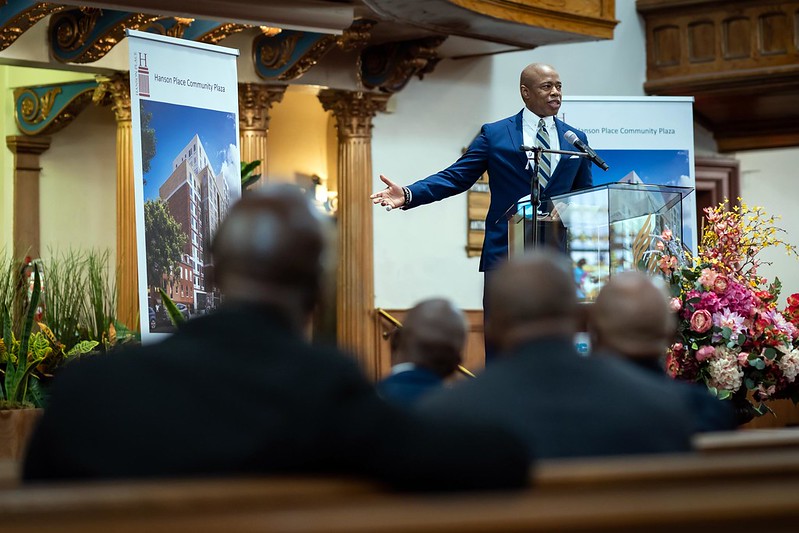
Mayor Adams talks housing (photo: Ed Reed/Mayoral Photography Office)
In the spring, the Adams administration announced “City of Yes,” a package of citywide zoning text amendments that ostensibly aim to advance affordable housing, jobs, and sustainability. ANHD applauds the recognition that a citywide approach is needed to combat our discoordinated land-use efforts.
But in a city driven by for-profit developers and powered by long-standing systems of racism and disparity, it will take an intentional approach to ensure we don’t continue to say “no” to land use equity. Instead, this administration must make New York a “City of Yes” for the land use needs and wants of our marginalized communities.
In the battle over land use in New York City there’s a growing push to label any community opposition to a given development as NIMBY (not in my back yard). This narrative is vastly over-simplified. It ignores the reality on the ground and the long-standing and ongoing power imbalances between communities.
It’s true that in the past several years we’ve seen neighborhoods reject a wide array of projects, from luxury housing to affordable housing to homeless shelters, infrastructure improvements to school construction. But to treat all this opposition as the same is not just wrong, it’s harmful. To paint all community opposition in the broad strokes of NIMBYism is to actively disempower and minimize the voices of low- and moderate-income communities of color and immigrant communities.
It’s essential to recognize the difference in why certain communities say no to land use and development proposals. There’s a fundamental difference, for example, between primarily white residents of Throggs Neck saying no to a rezoning that would bring affordable housing to a low-density section of the neighborhood versus immigrant residents and residents of color in Astoria saying no to a predominantly luxury housing rezoning like Innovation Queens.
It’s the difference between saying we don’t want any affordable housing in order to preserve our neighborhood character and saying we want more affordable housing in the quantity and depth of affordability that truly serve our community instead of displacing it.
It’s a recognition of the differences between neighborhoods and an understanding that in communities with higher displacement concerns a new residential unit is not necessarily a positive if it’s out of reach of local residents. The way to provide affordable housing in those communities is not to rely on a trickle-down housing approach that provides primarily unaffordable, market-rate units. If, despite this nuance, the mayoral administration takes the line that it will say yes to all proposals, and more specifically, that it will dismiss all nos, it will actively deny the empowerment and voices of low-income communities of color.
New York City cannot continue the mistakes of previous administrations. The answer is not to try to suppress or work around community engagement, input and decision-making, or further retreat from transparency and accountability. The answer is for this administration to be a trailblazer for equitable planning: with the central goal of empowering New York City’s marginalized communities.
The answer is to chart a course for planning that prioritizes the critical interests of those communities with the greatest need for affordable housing, good paying jobs, and long overdue capital investments, while facing the greatest risk of displacement and discrimination. The answer is to be intentional about whose voices and needs we’re centering in our land use process and to commit to an approach that puts their inclusion and power front and center.
The “City of Yes” is a critical opportunity for the Adams administration to lead equitable planning, by working in partnership with marginalized communities from the beginning. ANHD hopes this administration, unlike its predecessors, will hold robust community engagement and discussion, with a true opportunity for input and influence before any citywide zoning amendments are officially introduced. Not as an invitation for bad-faith actors to push policies of exclusion and displacement. But to ensure that those who have been harmed and disregarded by the zoning status quo are listened to and empowered, so we can finally begin to move towards the equitable planning outcomes we all claim to seek, and New York City deserves.
***
Barika Williams is the Executive Director of ANHD. On Twitter @barikaXw & @ANHDNYC.
***
Have an op-ed idea or submission for Gotham Gazette? Email This email address is being protected from spambots. You need JavaScript enabled to view it.